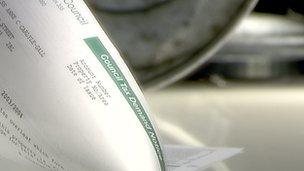More local authorities look set to increase council tax
- Published
- comments

It was meant to be the offer you couldn't refuse.
"If you keep your council tax frozen, we'll give you a grant equivalent increasing it by 1%."
Last year, the overwhelming majority of councils were persuaded. Out of 35 in the West Midlands, only three defied the government with council tax increases confined to Telford and Wrekin, Stoke-on-Trent (both Labour) and Lichfield District (interestingly, Conservative).
Just before Christmas, the Communities Secretary Eric Pickles told the Commons that councils had "a moral duty" to maintain the freeze next year as well, in order not go back to what he called the "years of hurt" when council tax bills had doubled under Labour.
But the signs are his blandishments may be less effective this time. In the West Midlands region 10 local authorities are considering a council tax increase in 2013-14: Birmingham (Labour), Cannock Chase (Labour), Coventry (Labour), Dudley (Labour), Herefordshire (Conservative), Lichfield (Conservative), Malvern Hills (Conservative), Tamworth (Conservative) and Telford & Wrekin (Labour)
So what has changed?
In the case of our largest authority - Birmingham - the answer is party control. The Conservative-Liberal Democrat coalition was replaced by Labour. But four of the other councils are Conservative-controlled, including Lichfield, which is expected to defy Mr Pickles for a second year.
The bigger difference is the increasing pressure on local authority budgets, and confirmation that the spending squeeze will last until 2017 at the very least.
Birmingham's Labour Leader, Sir Albert Bore says councils will be left with no option to decommission some services altogether. He says the government grants received by his council are being cut twice as sharply as the English average.
He calls it "The Jaws of Doom".
One jaw is the reduced spending power because of those cuts in government grants and the general condition of the economy. The other, the increasing demands placed on local authorities by the weakest and most vulnerable in the community who need their services most when times are hard.
"Big City" councils also have generally fewer revenue-generating opportunities than those in more affluent areas where fewer people depend on local services.
It all adds to the general sense of injustice
But the government is not alone in believing that many local authorities could do more to ease the burden they place on hard-pressed council tax payers.
In a recent interview on the BBC's Sunday Politics programme, the Conservative Leader of Staffordshire County Council, Philip Atkins, was adamant that many of them had a way to go yet in learning from private businesses how to do more for less.
Mr Atkins said more services could be merged across local boundaries such as in Bromsgrove and Redditch who share a chief executive.
But the more I hear of these exchanges, the more I see a bigger political picture emerging.
The government clearly want to bind local authorities into the UK deficit reduction process, to 'take their share of the responsibility' as ministers put it. But is it also about making sure the blame is shared. Devolved, even?
So the number of Conservative-run authorities planning council tax increases represents a serious challenge.
But Labour's leaders have a struggle of their own.
They are increasingly focusing on building-up their credibility on the economy in the run-up to the 2015 General Election, accepting that deficit reduction must continue into the next Parliament but devising ways of distributing the pain more fairly, they'll say, than the present government.
"Fairness" I predict, will be the political buzz word over the next two years.
Fairness to local authorities.
Fairness to council tax payers.
Or maybe just equal unfairness to everyone.